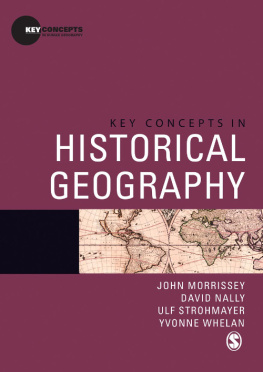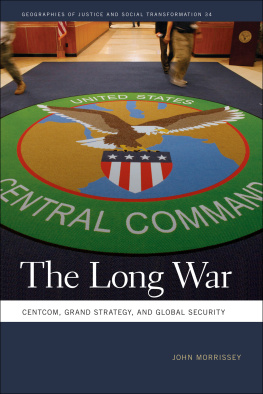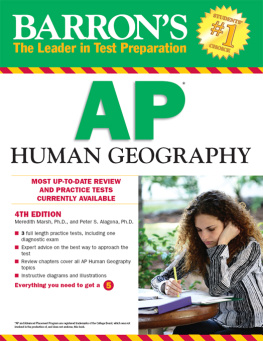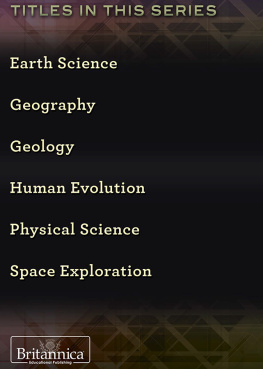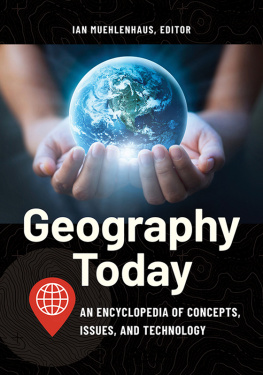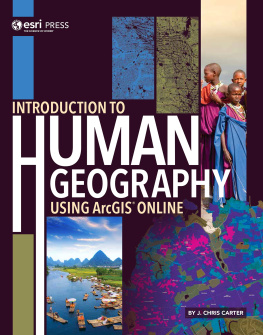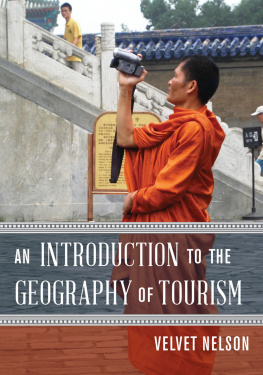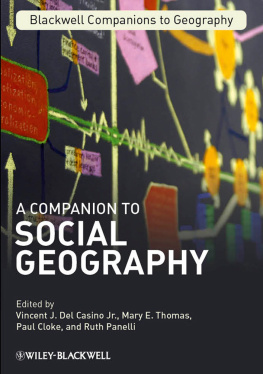


The Key Concepts in Human Geography series is intended to provide a set of companion texts for the core fields of the discipline. To date, students and academics have been relatively poorly served with regard to detailed discussions of the key concepts that geographers use to think about and understand the world. Dictionary entries are usually terse and restricted in their depth of explanation. Student textbooks tend to provide broad overviews of particular topics or the philosophy of Human Geography, but rarely provide a detailed overview of particular concepts, their premises, development over time and empirical use. Research monographs most often focus on particular issues and a limited number of concepts at a very advanced level, so do not offer an expansive and accessible overview of the variety of concepts in use within a subdiscipline.
The Key Concepts in Human Geography series seeks to fill this gap, providing detailed description and discussion of the concepts that are at the heart of theoretical and empirical research in contemporary Human Geography. Each book consists of an introductory chapter that outlines the major conceptual developments over time along with approximately twenty-five entries on the core concepts that constitute the theoretical toolkit of geographers working within a specific subdiscipline. Each entry provides a detailed explanation of the concept, outlining contested definitions and approaches, the evolution of how the concept has been used to understand a particular geographic phenomenon, and suggested further reading. In so doing, each book constitutes an invaluable companion guide to geographers grappling with how to research, understand and explain the world we inhabit.
Rob Kitchin
Series Editor

John Morrissey, David Nally, Ulf Strohmayer and Yvonne Whelan 2014
First published 2014
Apart from any fair dealing for the purposes of research or private study, or criticism or review, as permitted under the Copyright, Designs and Patents Act, 1988, this publication may be reproduced, stored or transmitted in any form, or by any means, only with the prior permission in writing of the publishers, or in the case of reprographic reproduction, in accordance with the terms of licences issued by the Copyright Licensing Agency. Enquiries concerning reproduction outside those terms should be sent to the publishers.
Library of Congress Control Number: 2013944222
British Library Cataloguing in Publication data
A catalogue record for this book is available from the British Library
ISBN 978-1-4129-3043-7
ISBN 978-1-4129-3044-4 (pbk)

SAGE Publications Ltd
1 Olivers Yard
55 City Road
London EC1Y 1SP
SAGE Publications Inc.
2455 Teller Road
Thousand Oaks, California 91320
SAGE Publications India Pvt Ltd
B 1/I 1 Mohan Cooperative Industrial Area
Mathura Road
New Delhi 110 044
SAGE Publications Asia-Pacific Pte Ltd
3 Church Street
#10-04 Samsung Hub
Singapore 049483
Editor: Robert Rojek
Editorial assistant: Keri Dickens
Production editor: Katherine Haw
Copyeditor: Neil Dowden
Marketing manager: Michael Ainsley
Cover design: Wendy Scott
Typeset by: C&M Digitals (P) Ltd, Chennai, India
Printed in Great Britain by Henry Ling Limited at The Dorset Press, Dorchester, DT1 1HD

Neil Smith (19542012), in memoriam
ABOUT THE AUTHORS
John Morrissey is a graduate of Trinity College Dublin, National University of Ireland and the University of Exeter. His research is primarily focused on questions of imperialism, geopolitics and resistance. He is the author of Negotiating Colonialism (2003) and co-editor of Spatial Justice and the Irish Crisis (2014). He previously taught at the University of Exeter and City University of New York, and now lectures at National University of Ireland, Galway. In 2012, he won the Irish National Academy Award for the Integration of Research, Teaching and Learning, and currently holds visiting research fellowships at Fitzwilliam College and Emmanuel College, Cambridge, where he is writing a geopolitical history of United States Central Command.
David Nally studied History and Geography at University College Cork before moving to Vancouver to pursue his doctoral degree at the University of British Columbia. He grew up in County Clare in the west of Ireland and is currently a Senior Lecturer in Human Geography and a Fellow of Fitzwilliam College at the University of Cambridge. His research interests include the political economy of agrarian change, the history of subsistence crises, and the politics of disaster relief. He has recently completed a book Human Encumbrances: Political Violence and the Great Irish Famine (2011) and is currently working on the making of the idea of food security.
Ulf Strohmayer is a graduate of Munich Technical University and Pennsylvania State University. Currently, he is Professor of Geography at the National University of Ireland, Galway, after teaching previously at the University of Wales at Lampeter. Educated in Germany, Sweden, USA and France, he has also held visiting teaching and research posts at the Universit de Pau et des Pays de LAdour, Dresden Technical University, Binghamton University and the Maison des Sciences de lHomme in Paris. His interest in social theory and philosophy is matched by an equal curiosity about the conditions and consequences of historical processes of modernization in Western Europe, all of which have informed his extensive publication record. He has also edited numerous volumes on social theory and the history of geographic thought.
Yvonne Whelan is a Senior Lecturer in Human Geography at the University of Bristol. She has published widely on the cultural landscapes of Ireland and is the author of Reinventing Modern Dublin (2003) and the co-editor of Ireland: Space, Text, Time (2005), Heritage, Memory and the Politics of Identity (2006) and Ireland Beyond Boundaries (2007).
ACKNOWLEDGEMENTS
Historical geography is fortunate to have such a rich and collegial academy, and it is a pleasure to recognize a wide range of wonderful colleagues here for their support, reading of chapters and patience as this book came to fruition. The patience required was due to the fact that the book has been a long time coming, for various reasons, but finally the acknowledgements get to be written, and written with pleasure.
John Morrissey would like to thank a number of colleagues who supported the project from the beginning. Particular thanks are due to Dan Clayton, Deborah Cowen, Zeynep Gambetti, Derek Gregory, Gerry Kearns, Stephen Legg, Alan Lester and Marilyn Young for their close reading of various chapters, and for their friendship and broader intellectual support over many years. Thanks are extended too to colleagues at NUI Galway for offering a wonderfully vibrant and supportive place to think, teach and write. Much of Johns chapters were written while a research fellow at CUNY Grad Center, and his grateful thanks to colleagues there go to Jeff Bussolini, Gregory Donovan, Tina Harris, David Harvey, Cindi Katz and Ros Petchesky.
Next page
